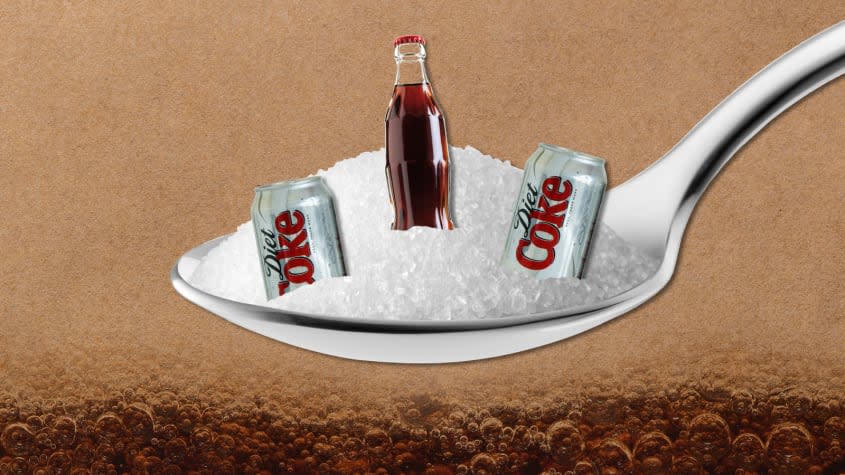Aspartame and cancer: should you stop drinking Diet Coke?

The World Health Organization's International Agency for Research on Cancer (IARC) is set to deem aspartame, the artificial sweetener used in many diet sodas and chewing gums, "possibly carcinogenic to humans," Reuters reported at the end of June. The impending ruling "does not take into account how much of a product a person can safely consume," Reuters continued. Instead, the WHO and the Food and Agriculture Organization's Expert Committee on Food Additives (JECFA) is set to decide appropriate consumption levels in a different report. Both analyses — the IARC's and the JECFA's — will be released on July 14.
But the unconfirmed news is already causing quite a stir. Aspartame has been considered safe for consumption since 1974 and was approved as a general sweetener in 1996, per Bloomberg. "There is broad consensus in the scientific and regulatory community that aspartame is safe," the American Beverage Association told the outlet. Still, however, this is not the first time research has shown a link between aspartame and cancer — last year, a study tied the sweetener to increased risks of "breast cancer ... and obesity-related cancers." The Center for Science in the Public Interest also flagged the artificial sweetener to the IARC back in 2014 and 2019, citing "compelling evidence that it causes cancer and is a potent carcinogen," Bloomberg continued. Assuming Reuters' reporting is correct, and the "possibly carcinogenic" classification is on its way, is it actually time to ditch diet soda?
Don't panic
The IARC "is not the agency that consumers should listen to with regard to food safety" because it is only equipped to assess the "hazard of a given substance" and "not the risk," Victoria Song wrote for The Verge. For example, while there is "a hazard of a meteor destroying the Earth or the sun causing skin cancer," that's "not what matters to the average person." The bottom line? Don't base your decision to consume aspartame on "a leaked report from a non-food safety agency."
The categories into which the IARC sorts these things "do one very specific thing," Amanda Mull mused for The Atlantic: "They describe how definitive the agency believes the evidence is for any level of increased risk, even a very tiny one." The "possibly carcinogenic" category, into which aspartame may soon be sorted, "makes no grand claims about carcinogenicity." It just communicates "how sure or unsure the organization is that there's a risk associated with a thing or substance at all."
In other words, "they're saying there is some evidence, but they're not saying the evidence is foolproof, and they're not saying anything about how risky it is," Kevin McConway, emeritus professor of applied statistics at the Open University in England, told Slate's Dan Kois. The actual threshold of consumption will be dictated by the JECFA.
Sure, "in a perfect world, you'd only drink plain water, but human beings like their flavor and [diet soda] is one way to get it without consuming a pile of calories," fitness coach Mitch Calvert lamented in the Winnipeg Free Press. "If a diet drink helps you reduce night-time snacking ... have at it." There are hundreds of studies that prove aspartame safe for human consumption, he said, and "unless you're a rat, or guzzle 20-plus diet drinks per day, you have nothing to worry about in moderation."
Perhaps we should listen ...
Maybe we shouldn't completely disregard the IARC's findings here, Keren Landman noted in a piece for Vox. "The way IARC conducts its evaluations gives its assessments a particularly high level of integrity," she wrote, meaning it's "worth paying attention to the agency's take on product safety." The IARC is also selective in using "unpublished, confidential commercial data," and takes care to "exclude people with conflicts of interest from contributing to its evaluations," something that the U.S. Food and Drug Administration or the European Food Safety Authority might struggle with.
Moreover, it's "mind-blowingly lazy to not explore the dangerous effects associated with these ingredients that are proven over and over," Huib van Bockel, founder of Tenzing Natural Energy drink, remarked in a piece for The Drum. "The lobby to keep these artificial sweeteners firmly in our drinks is real," and it's spending "tens of billions" on marketing to bolster its case, he claimed. "I guess, as always, it will become a David versus Goliath battle."
You may also like
Vietnam bans the 'Barbie' movie over map scene
Florida construction and agricultural workforces diminished after new immigration law takes effect
Judge limits how Biden officials can communicate with social media companies

